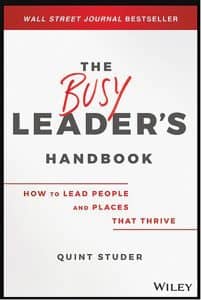 The Busy Leader’s Handbook
The Busy Leader’s Handbook by Quint Studer couldn’t have arrived at a more opportune time for the many among us who relocated and/or changed jobs during the COVID-19 pandemic. The helpful suggestions in this book prove most welcome during a time of unprecedented chaos and uncertainty. Studer puts a wealth of useful, practical information and tools into it. I was skeptical that his approach to presenting leadership advice would work, but he helped me to develop a deeper understanding of these themes with pointers and useful tools and techniques to become a better leader and manager.
Displaying pragmatism, Studer states that
The Busy Leader’s Handbook is a true desk book; you’ll want to have it handy to stimulate ideas and remind yourself of key takeaways from the content of chapters such as:
- “Let Values Be Your Guide.” He discusses living the values espoused by the company and being a model for your team.
- “Get Intentional about Time Management.” This chapter has great pointers about taking charge of your time by prioritizing, scheduling, and delegating.
- “Mentors Matter: How to Be a Great Mentee.” Whether you’re a mentor or mentee, there’s advice for getting the most value from the relationship.
- “The Power of Metrics: How Measuring the Important Things Helps Us Be the Best We Can Be.” Identify what’s most important to you and limit the number of measurements.
In the chapter “The Secret to Strong Relationships: Get to Know Employees Through Rounding,” Studer reminds us that “Leaders are only human” and stresses that work revolves around the human element and that we’re emotional beings. His advice for leaders is simple: Tell the truth, ask employees for help, and reward and recognize people for their accomplishments and successes, among other secrets.
Studer closes by suggesting that “improving our leadership is a gradual process”—one might say that it’s a continuous process. This book reminds management accountants and finance leaders that self-knowledge, communication skills, and valuing people (including superiors, peers, and subordinates) are critical to leading while keeping the company’s mission and objectives aligned, measured, and reported. It provides practical and useful insights for any busy professional to become a better leader, even in uncertain times.
 The Busy Leader’s Handbook by Quint Studer couldn’t have arrived at a more opportune time for the many among us who relocated and/or changed jobs during the COVID-19 pandemic. The helpful suggestions in this book prove most welcome during a time of unprecedented chaos and uncertainty. Studer puts a wealth of useful, practical information and tools into it. I was skeptical that his approach to presenting leadership advice would work, but he helped me to develop a deeper understanding of these themes with pointers and useful tools and techniques to become a better leader and manager.
Displaying pragmatism, Studer states that The Busy Leader’s Handbook is a true desk book; you’ll want to have it handy to stimulate ideas and remind yourself of key takeaways from the content of chapters such as:
The Busy Leader’s Handbook by Quint Studer couldn’t have arrived at a more opportune time for the many among us who relocated and/or changed jobs during the COVID-19 pandemic. The helpful suggestions in this book prove most welcome during a time of unprecedented chaos and uncertainty. Studer puts a wealth of useful, practical information and tools into it. I was skeptical that his approach to presenting leadership advice would work, but he helped me to develop a deeper understanding of these themes with pointers and useful tools and techniques to become a better leader and manager.
Displaying pragmatism, Studer states that The Busy Leader’s Handbook is a true desk book; you’ll want to have it handy to stimulate ideas and remind yourself of key takeaways from the content of chapters such as:



